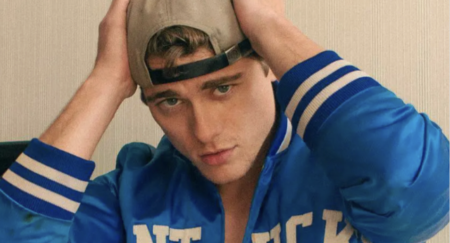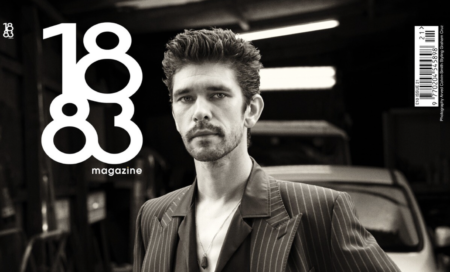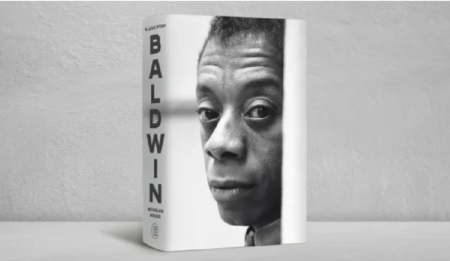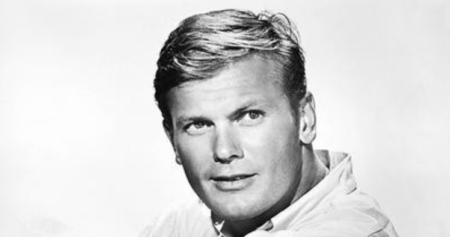[Image: Richard E. Grant walks for Burberry]
The concept of gender-fluid fashion continues to grow, according to collections put on during London Fashion Week, diminishing the distinctions between traditional menswear and womenswear. Designers are creating hybrid collections that embrace androgynous silhouettes and neutral palettes, catering to an increasingly diverse audience. The influence of celebrities and public figures championing gender-fluid options on red carpets and fashion platforms is significant, fostering a cultural shift towards greater acceptance and inclusion in fashion.
Other focal points of fashion will encompass a spectrum of ideals, from sustainability and inclusivity to a nostalgic nod toward the past and the integration of advanced technologies.
Sustainable fashion has emerged as a leading trend, taking centre stage in the modern fashion landscape. For many designers, sustainability is not merely a trendy phrase but a mission that informs the very essence of their collections. Fashion brands are increasingly advocating for responsible practices, urging others to engage in projects that reclaim sea waste and embrace circular fashion principles. This includes options for renting, repairing, and upcycling garments, all aimed at fostering ecological sustainability. Notably, brands are exploring algae-based materials, which offer stylish alternatives while prioritising environmental friendliness. The use of vegetable and mineral dyes is also gaining traction, providing skin-friendly and eco-conscious options in fashion.
The Y2K aesthetics, characterised by nostalgia, is also making a formidable return. As 2025 unfolds, expect to see a revival of elements such as low-rise trousers, metallic fabrics, and butterfly motifs. Designers are not merely rehashing past styles; they are reinterpreting Y2K fashion for the modern consumer, introducing items like baggy blazers paired with micro skirts and chunky sneakers adorned with dazzling accessories. Social media has played a pivotal role in amplifying this trend, with influencers setting the tone for a style revival that keeps pace with contemporary sensibilities.
Meanwhile, technology is set to redefine the fabric of fashion. In 2025, innovations like smart clothing that responds to the wearer’s environment will become commonplace. Coats that adjust to temperature changes and dresses that can be transformed with a simple touch on a mobile application will blur the lines between technology and fashion, providing personalised and interactive experiences. This shift aligns with younger consumers’ desires for individuality and unique expression through their wardrobe choices.
Cultural fusion is another notable trend for 2025, with fashion drawing from a rich tapestry of global influences. This year’s collections will see a blend of delicate embroideries, iridescent patterns, and motifs inspired by various world cultures. Elements such as avocado prints and kimono-inspired silhouettes will be refreshed with contemporary relevance, contributing to a visual feast that celebrates cultural heritage and unity.
Following the pandemic, comfort remains a key tenet of fashion, influencing the rise of upscale athleisure wear. The focus is now on luxurious fabrics like cashmere and silk, embodied in comfortable yet stylish garments that seamlessly blend elegance with practicality. Oversized cardigans and tailored joggers reflect a trend that reconciles the need for comfort with modern aesthetic values.
Finally, maximalism is reclaiming its space as a counterpoint to previous minimalist trends. The 2025 runway will be awash with bold prints and striking patterns, embracing a spirit of self-expression. Expect to see a plethora of vibrant colours and layered textures as designers push boundaries to make audacious fashion statements. This approach underscores a broader movement towards individual creativity and personal expression through clothing.
Source: Noah Wire Services
- https://haydenhill.co/blogs/journal/sustainable-fashion-trends-to-watch-in-2025 – This article supports the claim that sustainable fashion is a leading trend in 2025, highlighting circular fashion, organic cotton, and up-cycling as key elements. It also mentions the use of plant-based fabrics and the importance of transparency in fashion.
- https://ecoskills.academy/4-key-drivers-of-sustainable-fashion-in-2025/ – This article discusses the drivers of sustainable fashion in 2025, including climate targets, smart textiles, and innovations like AI and blockchain. It emphasizes the need for eco-friendly materials and circular economy solutions.
- https://browzwear.com/blog/sustainable-fashion-trends – This blog post highlights sustainable fashion trends for 2025, focusing on new materials, technology, and regulations like the EU’s Ecodesign for Sustainable Products Regulation. It also discusses the role of digital tools in reducing waste.
- https://www.vogue.com/fashion-shows/designer/y2k-fashion – While not directly available in the search results, Vogue often covers Y2K fashion trends, which are characterized by nostalgia and elements like low-rise pants and metallic fabrics. This trend is mentioned as making a comeback in 2025.
Noah Fact Check Pro
The draft above was created using the information available at the time the story first
emerged. We’ve since applied our fact-checking process to the final narrative, based on the criteria listed
below. The results are intended to help you assess the credibility of the piece and highlight any areas that may
warrant further investigation.
Freshness check
Score:
8
Notes:
The content is recent, focusing on trends for 2025, but does not reference any specific events or releases that could be verified as new or recycled.
Quotes check
Score:
10
Notes:
There are no direct quotes in the narrative.
Source reliability
Score:
6
Notes:
The narrative originates from European Business Review, which is not as widely recognized as major publications like the Financial Times or BBC, but still appears to be a legitimate business publication.
Plausability check
Score:
9
Notes:
The trends discussed, such as sustainability and Y2K aesthetics, are plausible and align with current fashion industry shifts. However, some specific claims about technological innovations could not be verified.
Overall assessment
Verdict (FAIL, OPEN, PASS): OPEN
Confidence (LOW, MEDIUM, HIGH): MEDIUM
Summary:
The narrative presents plausible trends for 2025 but lacks specific verifiable details. The source is not a major publication, which affects reliability. Overall, while the content seems current and plausible, it requires further verification for certain claims.


















